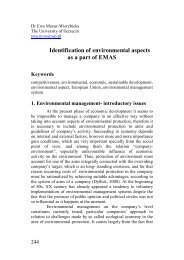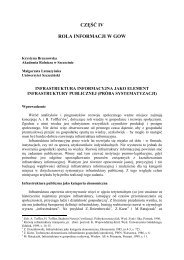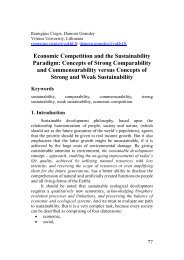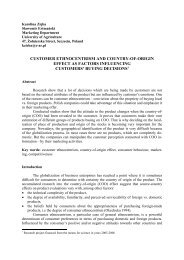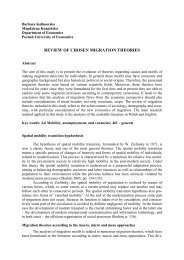corporate social responsibility as a valuable contribution to ...
corporate social responsibility as a valuable contribution to ...
corporate social responsibility as a valuable contribution to ...
Create successful ePaper yourself
Turn your PDF publications into a flip-book with our unique Google optimized e-Paper software.
Corporate Social Responsibility <strong>as</strong> a Valuable Contribution <strong>to</strong> Improvement ... 21<br />
The second way involved civil pressure expressed by the fact that citizens were not<br />
very willing <strong>to</strong> enable enterprises <strong>to</strong> take actions contradic<strong>to</strong>ry <strong>to</strong> their everyday life. In other<br />
words, capitalism oriented only <strong>to</strong> making a profit began <strong>to</strong> criticized <strong>as</strong> a result of human<br />
rights development and civil society. Consumer movement, environmental protection<br />
movement or animal rights protection movement played a profound role in these actions.<br />
The third way w<strong>as</strong> connected with business self-regulation. Most of all, <strong>social</strong><br />
movement appeared within capitalism and business itself, and referred <strong>to</strong> the reduction in<br />
corruption and frauds in business, greater transparency and the occurrence of so-called<br />
positive practices, i.e. relations with clients or relations with consumers (Rok, 2004).<br />
Globalization processes that <strong>to</strong>ok place until the end of the 1980’s were the next giant<br />
step in the development of this notion. It w<strong>as</strong> then that enterprises and organizations became<br />
an equal ac<strong>to</strong>r in international economic and political relations. This led not only <strong>to</strong> the<br />
reduction in the role of state but also imposed a new philosophy, with reference <strong>to</strong><br />
communities or ac<strong>to</strong>rs in whom the capital w<strong>as</strong> invested, on enterprises and particularly on<br />
MNC’s (Multinational Corporations) and TNC’s (Transnational Corporations). E<strong>as</strong>y flow of<br />
capital, that is controlled by corporations, contributes also <strong>to</strong> the fact that, among other things,<br />
capital is recalled from are<strong>as</strong> in which no profit accrues <strong>to</strong> a corporation, however, certain<br />
<strong>social</strong> problems and questions are left behind in communities in the form of, for instance<br />
unemployment. Therefore, the <strong>responsibility</strong> faced by corporations when their profits are very<br />
often higher or equal <strong>to</strong> the country in which they make investments and pursue their policies<br />
began <strong>to</strong> be emph<strong>as</strong>ized.<br />
Globalization is also caused by fiscal pressure on public institutions, which h<strong>as</strong><br />
contributed <strong>to</strong> the fact that a new form of cooperation between <strong>social</strong> partnership (so-called<br />
public private partnership) and its role in development h<strong>as</strong> been established. Therefore, there<br />
is a growing awareness of adapting this form of partnership <strong>to</strong> activities of firms. In other<br />
words, people have begun <strong>to</strong> think in different terms recently, which indicates that<br />
<strong>responsibility</strong> for the functioning of society is accepted not only by governmental structures<br />
but also by other ac<strong>to</strong>rs such <strong>as</strong> enterprises.<br />
In the era of globalization, one cannot forget about the evolution of <strong>social</strong> awareness,<br />
and hence greater importance of intangible values. Reflective current stresses new features<br />
determining long-term competitiveness of firms such <strong>as</strong> ability <strong>to</strong> create and develop<br />
trademarks b<strong>as</strong>ed on values cherished by key <strong>social</strong> groups (Moeller, Eldar, 2003).<br />
Fac<strong>to</strong>rs such <strong>as</strong> globalization, new forms of cooperation between business and public<br />
authorities and incre<strong>as</strong>ing <strong>social</strong> awareness of values in economy and <strong>social</strong> life developed<br />
thinking in terms of <strong>responsibility</strong>.<br />
Drawing up the general guidelines for MNC’s during OECD forum in 1976 w<strong>as</strong> an<br />
example of the above ide<strong>as</strong>. The guidelines referred <strong>to</strong> the following spheres: employment<br />
relations, corruption elimination, environmental protection and consumer protection. On the<br />
other hand, rules about conducting economic activity were introduced in 1994 during<br />
international business environment by the so-called Caux Round Table. These rules referred<br />
<strong>to</strong> the following issues (Rok, 2004):<br />
• <strong>responsibility</strong> <strong>to</strong> stakeholders,<br />
• no acting against the law<br />
• respect for the environment<br />
• supporting multilateral trade<br />
• respect for legal regulations<br />
• beyond the letter of the law <strong>to</strong>ward trust<br />
• <strong>to</strong>ward innovations, justice and world community.<br />
Despite uniform trends and tendencies, it is possible <strong>to</strong> differentiate between American<br />
and European models of CSR. In the c<strong>as</strong>e of the former, charity work and philanthropy of




